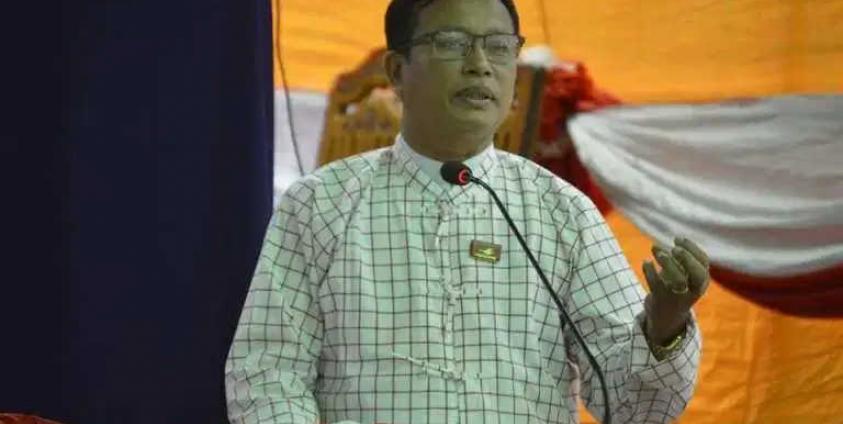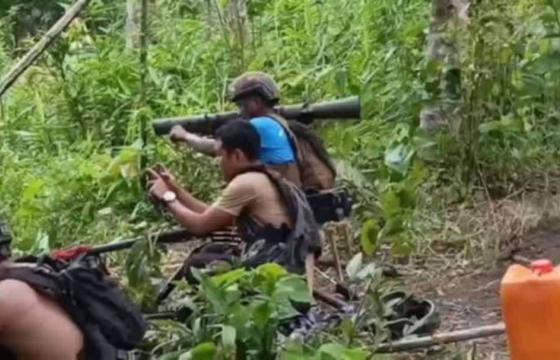Mon News Agency (MNA) Editor, Nai Wona Mehm, interviewed Nai Aung Ma Ngae, a spokesperson with the New Mon State Party (NMSP) one of the Ethnic Armed Organizations (EAO) who are signatories to the National Ceasefire Agreement (NCA-S EAO). The interview focused on the current state of play with peace process discussions amid the Covid-19 pandemic.
Question: Can you tell us what is the latest situation in the ceasefire talks between the government and the NCA-S EAO amidst the COVID-19 pandemic?
Answer: Our working committees on both sides are holding meetings. On April (2nd-4th), the planned process took place, and another meeting will continue on April 27th.
Question: What kind of meeting is it?
Answer: It is a NCA implementation discussion working committee, which is the same committee that is formed by the Joint Implementation Coordination Meeting (JICM)’s decision. The Committee includes 14 members from our EAOs and ten members from the government side.
Question: So, can it be said that meetings for the peace have been operating regularly?
Answer: It is running regularly. The Karen National Union (KNU) and Shan representatives have attended the meeting in person this week. I joined the conference from home through an online connection.
Question: What did the discussion involve and were there any decisions coming from the meeting?
Answer: There are still many points for negotiation. We have discussed reaching agreements that are acceptable for all and in line with our ethnicity’s needs as well as obtaining a good result from the Union Accord when the Union Peace Conference (UPC) takes place.
As mentioned previously, the Nationwide Ceasefire Agreement (NCA) implementation framework will be discussed. The process of establishing a federal union into the future beyond 2020 will also be negotiated.
We will adjust the federal principles. If federal principles are approved at the UPC, they will be included in the Union Accord. We are still discussing the 24 points. After that, we will present them to the UPDJC (the Union Peace Dialogue Joint Committee).
Political parties will be also involved in these discussions. There will be a public consultation, based on information provided by the UPDJC. A national-level political dialogue will also be held.
However, we have not reached the level of implementing these at the moment. It is not because of the COVID-19 epidemic that we are unable to implement [the plans]. It is because we have not finished our discussions, and the information is not complete. It does seem like the steps are a little sluggish.
Discussions in upcoming political dialogues will not be based on own data and information but dialogue will be within the framework of the UPDJC. It is intended not to have a dialogue beyond this framework, in order to have a good outcome.
Without negotiation in advance, previous experience tells that there have been arguments at the UPC. For example, two points were proposed by the other side but then three points were made by us. Also, it became a debate and resulted in nothing. Previously the UPC only secured 14 out of 37 points.
For this upcoming peace conference, the government, Tatmadaw, Hluttaw representatives, and EAOs are going to negotiate in advance with political parties and then bring their proposals to the UPDJC.
There will be national-level political dialogues, public consultations based on feedback from the UPDJC. It is hoped that we will find consensus through these activities and then the Union Peace Conference can be held. Currently, we are still trying to have a consensus.
Question: What are the problems occurring in the current negotiations?
Answer: For the difficult points, we will reach good results through discussion. For example, we still have some points to negotiate with the Tatmadaw regarding the process of building a federal union in the future beyond 2020.
The government proposes DDR (Disarmament, Demobilization, and Reintegration) under the security reintegration section of the talks. This includes a discussion on proposed definitions of SSR-DDR (Disarmament, demobilization, and reintegration (DDR) and security sector reform (SSR) processes).
Question: Do you think the upcoming meetings will work well?
Answer: The State Counselor (Daw Aung San Suu Kyi) has proposed five key principles. The government has accepted the principles stating;
- That there must be decentralization of power in line with the federal system.
- Resource allocation and taxation.
- Equality with the federal system.
- The State’s constitution must guarantee self-determination.
- The allocation of State power must be based on the people.
[We] will try to include these principles] and will decide which ones are similar to ours.
The upcoming discussions will follow a top & down approach. We have already gained a lot of important points from previous national-level political talks by applying this approach.
Of these five principles, the Tatmadaw added the term “Democratic federalism” instead of using the term federal union. The Tatmadaw has amended these words to create state autonomy, without contradicting the federal constitution, which allows all States and Divisions to have an equal right to self-determination.
Question: The next question is regarding the AA (Arakan Army) which has been labeled a terrorist group by the government. How could this affect the current peace process?
There is a problem. There was an agreement at the Joint Implementing Coordination Meeting (JICM). There has been talk of encouraging non-ceasefire groups to join the ceasefire. After saying that, the government’s statement [of the AA], means we cannot move forward, no matter to what extent our efforts have achieved.
We can no longer meet. We are now in this situation. We all have accepted that peace will be achieved by all ethnic armed groups’ inclusion. Also, there is a sense that the involvement of the KIO (Kachin Independence Organization) [in the peace process] will be difficult as some of the AA (Arakan Army) military bases are located in KIO territory.
If the KIO does not join, [other] northern allies will be unlikely to join as well. Then, it could become difficult for all organizations to get involved in building peace together.
After the government’s statement was issued, there has been no discussion or new suggestions regarding this issue.
Question: The current peace process involves only 10 Nationwide Ceasefire Agreement (NCA) – signatories and the government. There are other powerful EAO’s like the Northern Alliance. What are the plans for your ethnic group to include those organizations in the peace process?
Answer: PPST (the Peace Process Steering Team) is to make a statement, which has not yet been released. [We] are still observing the information, and will have to decide whether or not the statement should be published. As I have mentioned, since the government identified some groups as terrorist organizations, it has become [an obstacle] for peace.
Our Party (NMSP) holds to the decisions achieved from the JICM meeting — those decisions shouldn’t have been destroyed.
Question: So, it will become difficult for the Northern Alliance to participate in the upcoming peace conference?
Answer: There will be some difficulties regarding the conference. However, it has been quiet. Since our 12 ethnic armed groups have already discussed 24 points regarding the federal union, it will not be a matter of whether or not they will attend the conference. (The most important discussion will be to reach agreement on the 24 points at the conference.)
Question: Finally, what happens if stakeholders say that they did not participate in the Union Accord because they did not participate in the Peace Accord?
Answer: The point is not to miss those 24 points. Regarding those points, it is important to know that it is not 100 percent possible to fulfill all our needs. We will get as much as we can.
Without such an understanding, it will not be easy. It will not be easy for all organizations to be alike due to differences in dealing with various obstacles based on the situations of ethnicity and regions, where our parties are.
Some organizations are strong while others are struggling to survive. Therefore, it is impossible to get a single opinion.
<><><>
Caption :
Photo – Nai Aung Ma Ngae, a spokesperson for NCA-S EA0 (on the right) (Aung Ma Ngae)








